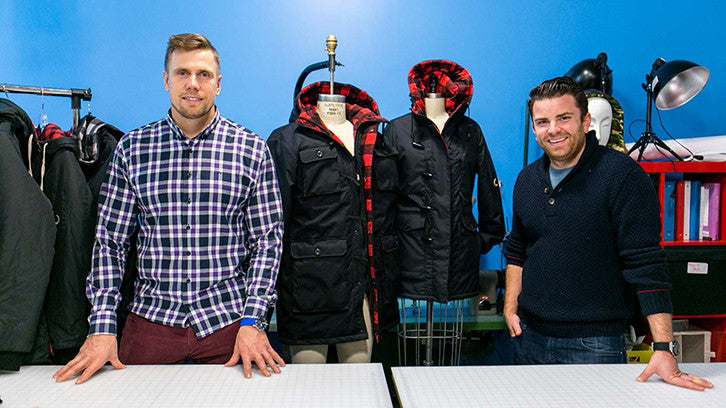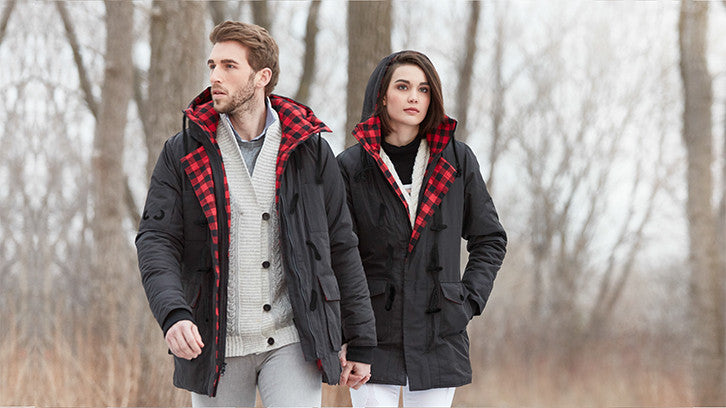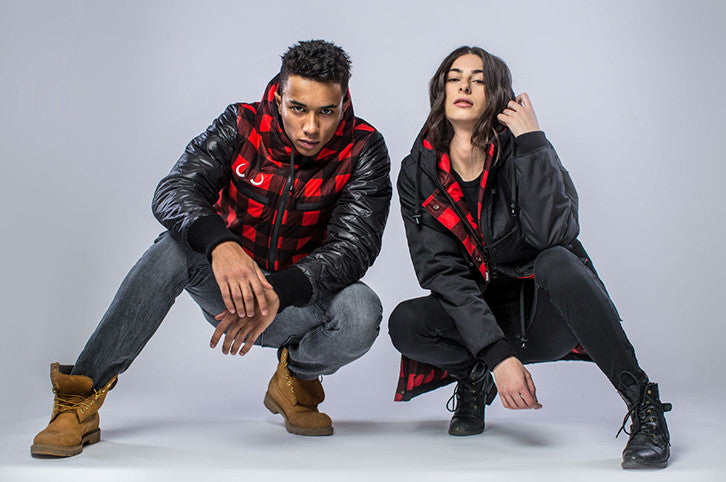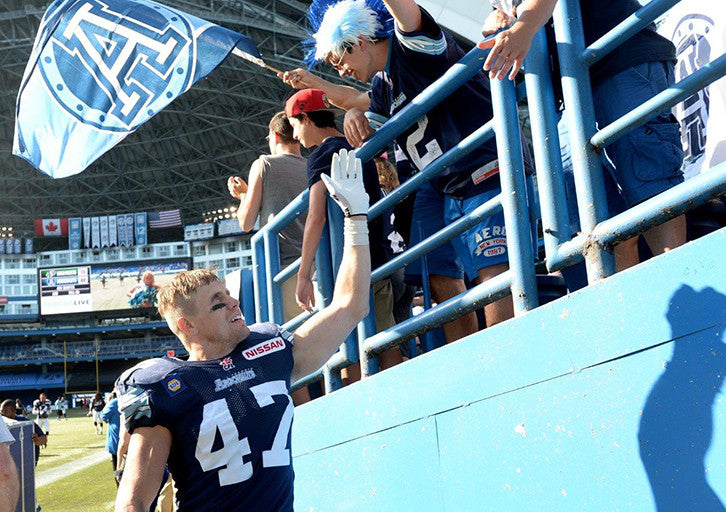James Yurichuk is building a winter jacket brand to rival the industry stronghold, and that’s just his side gig.
Wully Outerwearis a back-up plan, soon to become his primary bread and butter, as heprepares for imminent retirementfrom his day job. Here’s the thing: he’s only 30 years old.
In his field, though, 30 is exceptional. James is a pro football player in the CFL (for non-Canadians and the sports-challenged like me, that’s Canada’s answer to the NFL). In pro sports, especially one as physically demanding as football, an average career is significantly shorter than most professions. In fact, James’ teammates typically play in the CFL for two years. He’s an anomaly, however, and has managed to stretch his football career to an incredible eight.
But his time is running out. If he played for the NFL, the cushy six or seven-figure salary would help ease him more comfortably into retirement or the next big thing. In the CFL, bless our Canadian modesty, it’s a “blue collar” job.

Many players don’t depend solely on football to meet their cost-of-living needs, especially in a city like Toronto, andjuggle side jobs as bank tellers, real estate agents, and truck drivers.
Four years ago, James and his wife were living in a basement apartment, dependent on his tenuous football career, and expecting a baby. If he was going to support his growing family, he’d have to start working onhis own plan B.
"I knew with a baby on the way, a basement wasn't the best of living conditions. I said, ‘I've got to start something.’ I could see that football wasn't going to last forever.”
I knew with a baby on the way, a basement wasn't the best of living conditions. I said, ‘I've got to start something.’
The idea for James’ business hit him one blustery winter day, as the wind whipped up Bathurst Street from the lake, and through his inadequate coat. Though suburban Toronto was his hometown, he had spent a number of years playing football out west, in BC’s milder temperatures.
When he returned to Toronto, the cold winters demanded an upgrade in his family’s outerwear. And, when he went shopping for a premium winter coat for his wife, there was one problem: he couldn’t find one that wasn’t covered or filled or adorned with animal-derived materials.
This is the point in the conversation where you might do a double-take. Wait, what?
James doesn’t fit the animal activist stereotype. He’s just a guy, he says, who really likes animals. But, the fur trim on Canada Goose jackets just didn’t sit right with him, so he decided to offer an alternative.
You might like:The Unlikely Story of the Activist Who Shook up the Fashion World
Meet Wully Outerwear
Before starting his business, James didn’t know the first thing about, well, business. Nor did he have any experience in thefashion industry, or even a clue how to design or manufacture apparel. As luck would have it, his childhood best friend,Anthony DeBartolo, was a prominent Toronto tailor.

"We've been best friends since '92. I was recently the best man at his wedding.”
The two decided to go into business together. Before they were Wully, the first iteration of the company was called Mammoth Outerwear. (We’ll get to that later.)
In the two years gearing up to their firstKickstarter campaign, James put in long hours getting the business off the ground while simultaneously pushing his body through gruelling workouts. The training camps, he tells me, were the hardest, when he’d cram visits to the manufacturer into 15-hour days of intense physical activity.
“那些公司的三伏天。br之前eakfast would start, I'd drive over to my manufacturers at five in the morning, just grind it out for a couple of hours, make sure everything was coming along, go practice, and then back to my manufacturers at lunch. Then I’d come back and meet from four until about 10:30 or 11 at night. You've got to just go to sleep right away.”
Getting (Kick)started
Mammoth used Kickstarter to generate funds for their first production run, and to launch the brand. They exceeded their fundraising goal, and the experience taught them some valuable business lessons. From the beginning, they realized that their audience expectations were off.
“When we started our Kickstarter campaign, we only had one women's jacket. We found out 60% of our customer base was women. We only had a bomber at the time and they wanted a three-quarter jacket. We had to quickly scramble and design one in a day and a half."
 They enlisted the help of a consultant to guide them through the process, and James’ brother produced the video. The research and consultant helped them avoid the Kickstarter pitfalls that a lot of new brands will encounter, and James is keen to share his advice with fellow startups.
They enlisted the help of a consultant to guide them through the process, and James’ brother produced the video. The research and consultant helped them avoid the Kickstarter pitfalls that a lot of new brands will encounter, and James is keen to share his advice with fellow startups.
"There are so many things to know to make it a successful campaign. We researched other campaigns to see what had success. We learned that you've really got tocraft a good story.Have a great video. Don't over-promise, then under-deliver, or you're going to be doing four or five hours of emails a day, just trying tokeep the customers happy.我们把一个非常紧凑的时间表和幸运的是我们did deliver on time. I see some other companies who have had their pages trolled on Kickstarter because they didn't deliver on time.”
Don't over-promise, then under-deliver, or you're going to be doing four or five hours of emails a day, just trying to keep the customers happy.
In the early days, as the story goes with scrappy startups, James and Anthony wore many hats. They handled all of the customer service communication and, James tells me, it was the most time-consuming part of the business.
“The communication with customers is important, especially when we're selling $700 garments. Each sale is super important. We want to make sure these customers are happy. If you're a younger company, I think they can understand it a little bit more if there are some certain delays."
他们学会了使用优秀的客户服务compensate for manufacturer delays during the growing pains. They learned that manufacturing always takes longer than expected, and tomanage customer expectations, rather than rushing the product.
"When things are rushed, it ends up costing more money. Mistakes are going to happen no matter what. When they do happen, just don't do it again.”
Mistakes are going to happen no matter what. When they do happen, just don't do it again.
Incubating a Brand
Through the social component of his CFL job, James frequently spoke to large groups and learned toexercise his networking muscle.The people skills helped him quickly make contacts in the industry. He was introduced through a contact to the Ryerson Fashion Zone, an incubator run by a local university. From there, he built more connections that helped grow his team.
"That's been a good place for us to give us the tools that we need to learn the fashion industry because my background is in football. The incubator has really helped us. Partnering with Ryerson, I feel like I'm at the mouth of the river. There's all this talent just coming to us. These are the fresh graduates, right in the downtown core. They know the fashion trends. We take them on our team and we try to develop their skills too. It's been a good journey so far.”
Now, his team of two has grown to double-digits and they will soon outgrow their space. James’ role is now focused on his strengths—making connections with people—but he owes much of his business knowledge to being hands-on with every aspect of the business from the start.
“I think as the founder of the company, I'm proud to say that I have a hand in every role of the company at some point or another.”
I'm proud to say that I have a hand in every role of the company at some point or another.
Now, his team is padded with experts in their respective fields, and he’s even hired on someone to specifically handle quality control—an important aspect of production for a business that sells $700+ garments.

James keeps a close eye on quality himself, and says it’s one of the many reasons he’s committed to keeping manufacturing in Canada. Changes can be made on the fly, without the 2-4 week delay that sometimes comes fromoverseas manufacturing.
The company’s brand, too, is fiercely Canadian, and local manufacturing weaves into the brand story andsocial impact mission.
“We work with a manufacturing facility in Regent Park, which gives opportunities to people like Syrian refugees and single mothers. They train them in this facility to sew. We want to give these people jobs because this is home for us and we want to make Toronto a great place.”

Free Reading List: How to Brand Your Business
A great brand can help your products stand out from the crowd. Get a crash course in small business branding with our free, curated list of high-impact articles.
Get our Branding reading list delivered right to your inbox.
Almost there: please enter your email below to gain instant access.
We'll also send you updates on new educational guides and success stories from the Shopify newsletter. We hate SPAM and promise to keep your email address safe.
Social Good
OK, so James Yurichuk is an unlikely activist. In fact, he’s reluctant to use the label to describe himself. Yet, activism quietly backs his animal-free coat company’s mission. Wully Outerwear is a brand built on social good, but there’s nothing heavy-handed about it. James’ aim is to make the coats accessible and to give back in the process.
“We don't judge others on what they choose to wear. We're just putting an alternative out there, where our brand is really more celebrating the wild instead of using it in the garments. I've never been extreme in any way in the animal rights department. I just have respect for animals. I love watching Planet Earth.”
I've never been extreme in any way in the animal rights department. I just have respect for animals. I love watching Planet Earth.
The company’s David and Goliath match-up with their top competitor, Canada Goose, has garnered them the most attention. This year, Wully launched a trade up program aimed squarely at Canada Goose customers, offering up to $300 towards the purchase of their jackets in exchange for the customers’ old fur-trimmed style. The trade-ins are then repurposed and donated to the homeless, while the fur trims are sent to annual sanctuaries, who use it to comfort injured animals.
A portion from the sale of each garment also goes to theAssociation for the Protection of Fur-Bearing Animals.The good-deed-doing is a no-brainer for a nice guy like James, but he’s racking up a wealth of good business karma in the process.
"I know that if we're successful in the social areas, the money will just take care of itself. I keep it real important for us. Although it might dip into the margins a little bit, it makes me more passionate about the business and I think makes people love our brand more.”
I know that if we're successful in the social areas, the money will just take care of itself.

The Wully Mammoth in the Room
Last year, Mammoth hit a snag, when a $300-million Swiss company Mammut (German for Mammoth) took notice, and began to apply pressure.
“They started to flex on us. It was twofold: we were like ‘Crap, we have to switch our name.’ and at the same time like, ‘Oh, they're taking notice of us. That's pretty cool.’ We had to launch under the new name, Wully, but luckily it was a smooth transition. We spelled it our own way this time. Being a vegan brand, we couldn't have ‘wool’ in our brand name.We've since trademarked it.”
Since the name flip, the company, now Wully Outerwear, hasn’t lost momentum. The keys to their early success werestrong brandingand storytelling, social activism, and honing the details of their core product before expanding. A name change was a minor blip.
They had originally launched with just four styles—two men’s and two women’s jackets—concentrating on getting them right.
"If you spread yourself too thin, you're going to find that four jackets, by just changing a couple colors and sizes, quickly turns to 120 SKUs. My advice for anyone starting a store is to keep the SKUs down. Then, once you master those, then you can open it up a little bit.”
My advice for anyone starting a store is to keep the SKUs down.
One winter coat can have as many as 20 different materials from several sources. Perfecting the coats means carefully selecting the fabrics and finishes, with, in the case of Wully, the added complication of meeting ethical standards.
 James is also almost obsessive about fit. I’m tall, and he towers over me at 6’3”. We’re both no strangers to fit issues. I ask about the company’s plan to offer tall, plus, or petite sizing, but in the company’s early stages, he tells me, they’re just trying to nail average for now.
James is also almost obsessive about fit. I’m tall, and he towers over me at 6’3”. We’re both no strangers to fit issues. I ask about the company’s plan to offer tall, plus, or petite sizing, but in the company’s early stages, he tells me, they’re just trying to nail average for now.
"Anyone can get into the design industry, especially through e-commerce, but you've got to make sure your fit is right. You don't want people returning product because it's too loose, it's too tight. You want to find a healthy medium. You've got to really tinker with it at first. I have a really good pattern maker.”
Now that they’re pleased with their core product, Wully plans to design new styles and offer more colorways, as well as a lower-priced mid-weight option. On top of the expansion, the business will shortly need to find new digs—their incubator days are numbered.
Leveling up costs money, though, and the company is considering a second Kickstarter campaign.
“We need a huge amount of financing. Rather than go to investors, at this point, we want to keep the integrity of the brand and keep it in house. Since we're so young, it's hard to get banks to trust us at this point with that amount of money. That's why we're thinking about doing Kickstarter again.”
James realizes that it won’t just take money, but people-power too. And his own energy is spread fairly thin. Wully’s next big move might just have to coincide with his own.
“I think if we were to go through it, I think I'd say that in our pitch ‘I believe in this project so much that if I were to get funded, then I'll be able to step in the next phase of my life and say goodbye to football.’”
一个企业家
Entrepreneurs are made in the most unusual of ways.Sometimes you’re born with it, and sometimesa series of jobs and experiencesand a little bit of blind faith can combine to give you the tools to be your own boss.
James wasn’t raised by entrepreneurs, but the lessons he learned from them were valuable in his entrepreneurial journey.
“Although my parents weren't entrepreneurs themselves, they both had a great work ethic. They had an honest attitude and lunch pail. My mom was always well-liked because she's just such a kind person, and being kind and honest when dealing with people every day, it pays off. I learned that from her. My dad just never missed a day of work. I got that from him.”
Although my parents weren't entrepreneurs themselves, they both had a great work ethic. They had an honest attitude and lunch pail.
Most surprisingly, though, it was his sports career that really groomed him for his current gig. There are no days off when you’re an entrepreneur, but for James, it’s no different than his pursuit of professional sports. In high school, he played on three teams, sometimes having back-to-back-to-back practices on the same day, and on top of his school work.
He’s also prepared for the competitiveness of startup life, especially in fashion. Football, he says, made him a survivor.
"They say fashion is the most competitive industry in the world, but I was already in the most competitive industry. In my first year as a rookie in the CFL, I had a locker to my right, a locker to my left. Over the course of the year, I had seven different locker mates because people kept on getting cut. If you don't keep a certain standard, you can't survive in that industry. It’s the same thing in fashion."

As an older player, he’s honed leadership skills, and likens his captain role on the team to leading employees of a small startup. Now he’s also sharing his knowledge with the younger generation.
“Every year I speak to the upcoming class of Canadian CFL players. I tell them, ‘Use football as a vehicle to take you where you want to go.’ I think it's helped me with this business—just connecting, meeting people, building a trust. You've got to have a good reputation and make sure you keep a good, clean slate along the way.”
Every year I speak to the upcoming class of Canadian CFL players. I tell them, ‘Use football as a vehicle to take you where you want to go.’
What's Your Plan B?
The seasonality of the CFL meant that James could plug away at his plan B on his own schedule in the team’s downtime. The flexibility of entrepreneurship and ecommerce allowed him to make his own hours, and put football first when it was required of him. It’s catching on. He’s seeing a growing number of his fellow players pursuing their own side hustle.
“Some have little side businesses, like t-shirt companies. There are a lot of successful business people that have come out of CFL. One guy, Johnny Forzani, actually just ran a Kickstarter for his company, and Sport Chek was developed by his uncle, also a former CFL player.”
Pro sports isn’t the only career prone to volatility and early retirement. Around here we’re big proponents of “do what you love” and sometimes that means taking risks. So pursue acting or pro tennis or audition for America’s Got Talent if that’s your thing. But have a back-up.
*ahem*
Entrepreneurship is generally billed as the risky move—quitting your job to delve into the unknown. But, flipped on its head, it can also be the safety net. Ecommerce is an attainable plan B that can build slowly while you’re still active with plan A.
Someday, James’ own plan B will move into A position, when sports are no longer a viable career option. And, he says, he’s ready for it.
“It's tough because I've been playing eight years and I've never missed a game. I'm the current active streak leader, but I'm having so much success with the Wully as a part-time thing. I know if I did it full-time, I could definitely make it even more successful.”


